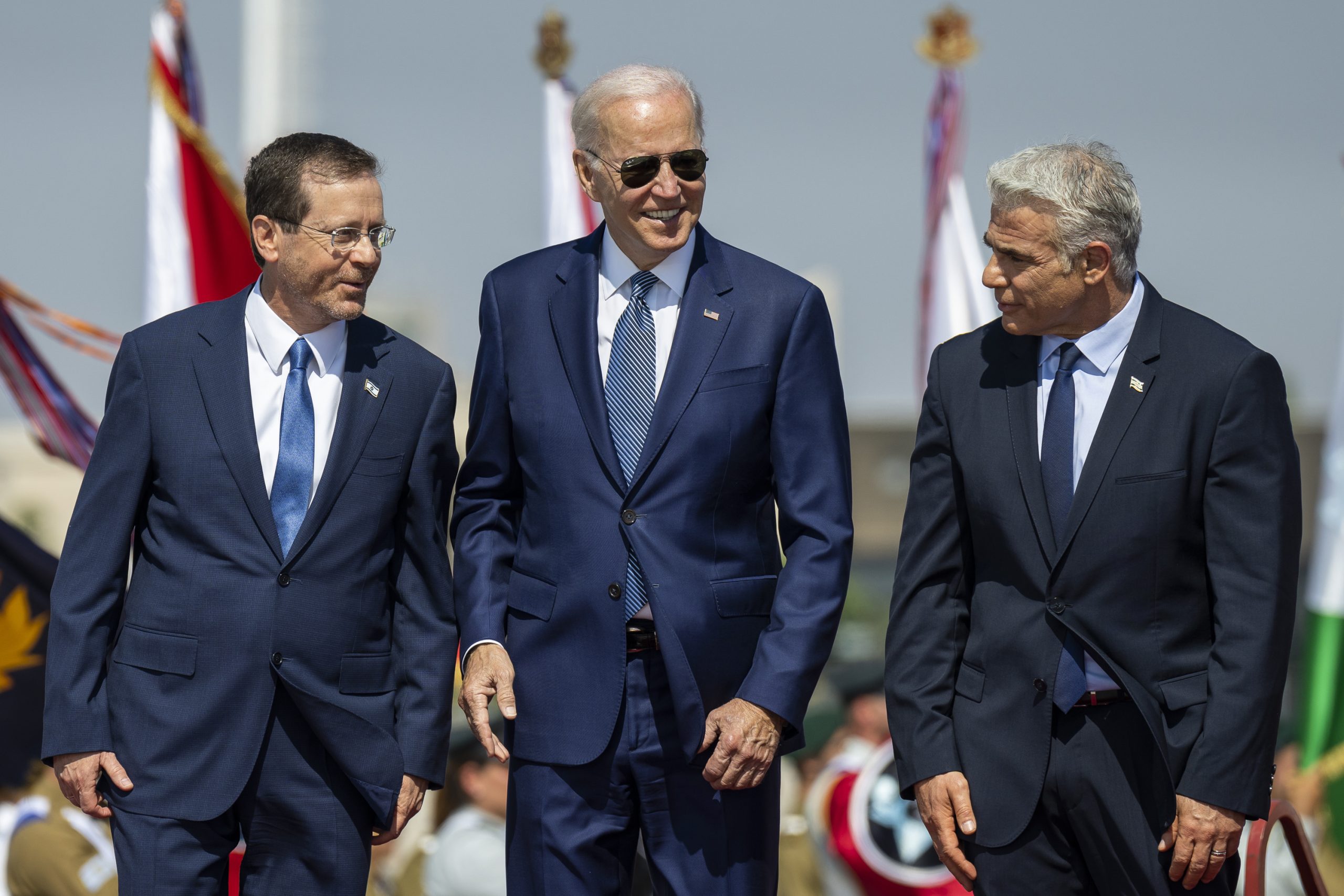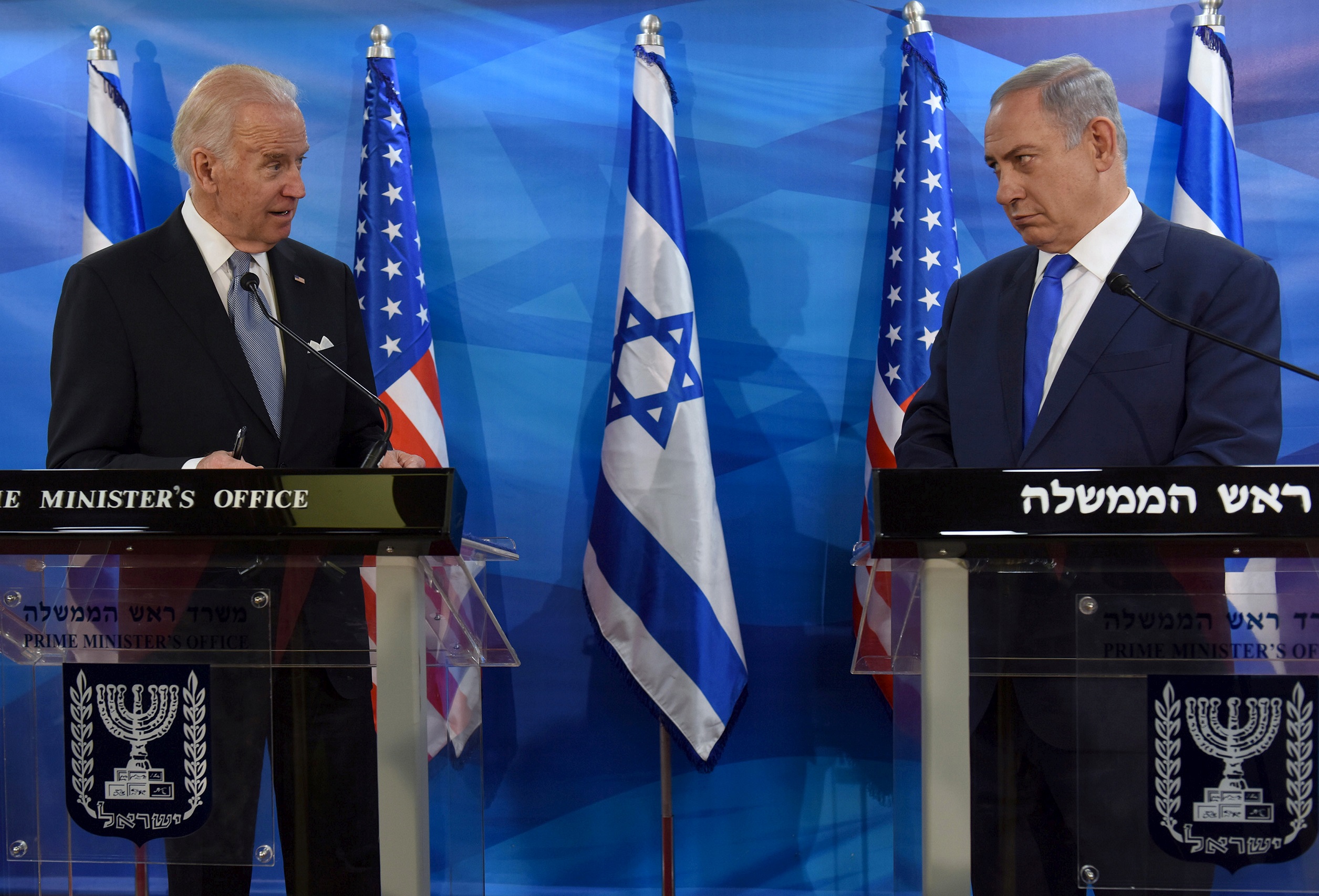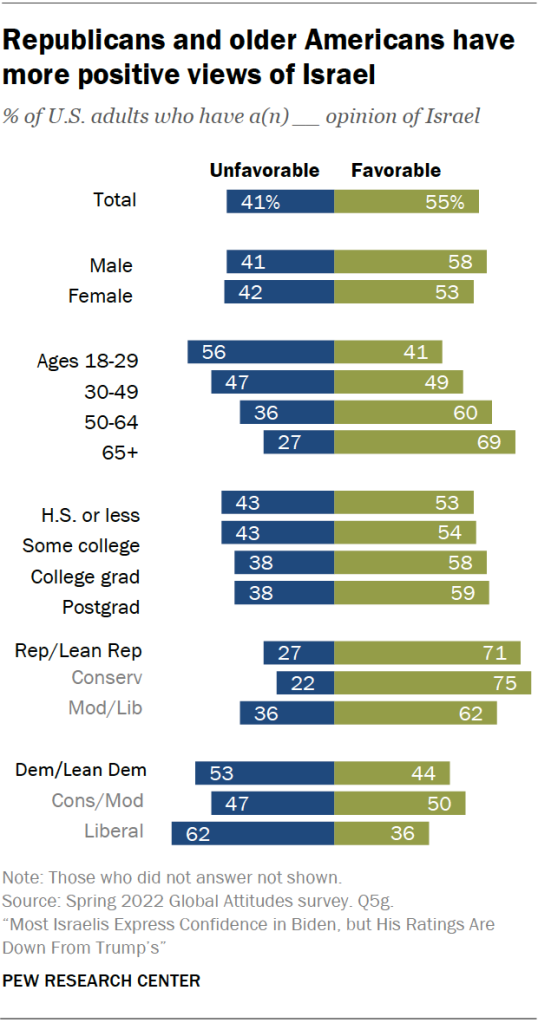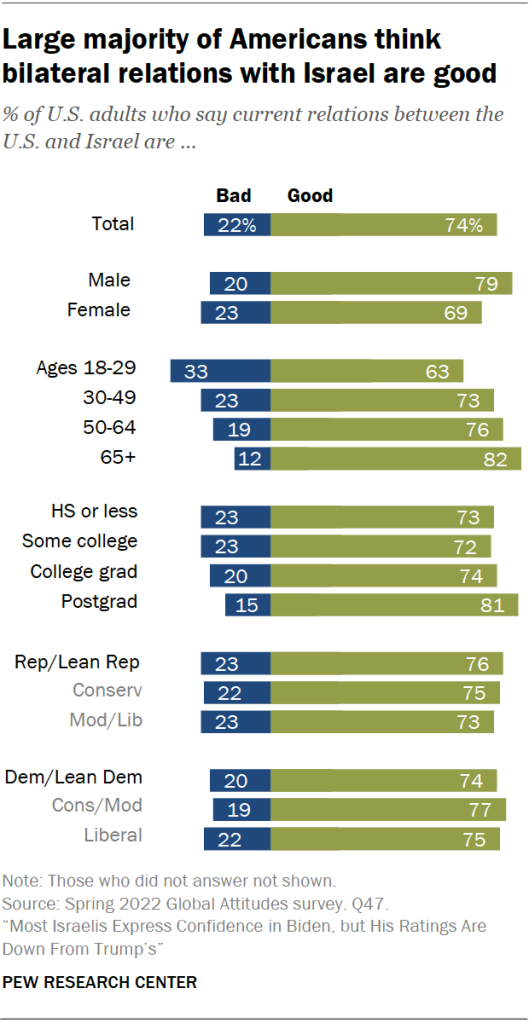Publications
INSS Insight No. 1656, November 8, 2022
Israel’s stance regarding the war in Ukraine, which positions it between the West and Russia, and the composition and potential policy of the incoming Israeli government, particularly on the Israeli-Palestinian conflict, highlight issues that are at the core of the special relationship between Israel and the United States. This relationship has been upheld over the years based on the American understanding that the two countries have shared values. Support for Israel in the United States is still high, although there is rising criticism, particularly from Democrats, and polls show that it is growing stronger among younger people. Even if Israel adopts a policy that completely satisfies the opinion of its critics, developments in the United States indicate long term trends that could cause substantive erosion in support for Israel even when they are not directly related to Israel. These trends stem from demographic changes in the US and its political polarization, and compound the growing populism and anti-Israeli tendencies in the progressive movement that challenges the Democrat establishment from the left. Israel must think seriously about the expected consequences of these trends for the future commitment of American presidents and lawmakers to its security, and adjust its policies to the emerging reality, including by broadening relations so that they also encompass “life itself” – health, climate, economy, and technology. The Jerusalem Declaration should be seen as a first and important step in this direction.
The special relationship that Israel has long enjoyed with the United States has recently returned to the Israeli debate with greater urgency, primarily in the context of the war in Ukraine and the question of which side Israel should support for moral reasons. The US administration leads the international coalition that is helping Ukraine in its war against Russia, while Israel, for security reasons connected to its relations with Moscow, has remained relatively neutral. Part of the debate refers to the balance between the US contribution to Israel on security, economic, and policy levels and the Israeli response.
The solid foundation on which the two countries built their relationship enabled them to maintain it even when there were disagreements between governments. This was above all due to the US understanding that the countries shared common values (freedom, democracy, and civil rights) and a common ethos (each is a nation of immigrants arriving at “a land of unlimited possibilities”). Empathy for Israel in the US political system was based on an understanding among the American public that the ties were important and arose from a commitment to the security of the Jewish state. Over the years, the United States and Israel have promoted common interests and set up frameworks that facilitated agreement over their mutual needs and interests, leading to collaboration on a wide range of subjects. Israel for its part was careful to maintain its support for both US political parties, so that both sides in the US political system would see the relationship as above any controversy.

President Joe Biden’s visit to Israel in July 2022, and the Jerusalem Declaration regarding the strategic partnership between the two countries that was signed then underscored that the Biden administration remains committed to Israel’s security. Moreover, the President, who throughout his political career has expressed support for Israel, attached moral importance to the visit even if there were no significant political achievements.
The administration has been careful to remain neutral over the results of Israel’s recent elections, although criticism has already been heard, mainly in the ranks of the Democrats in Congress, about the expected composition of the government. Clearly there is concern in the administration about Israeli actions, particularly with respect to human rights and in the Palestinian context.
In addition, public opinion polls conducted by Pew Research Center show that most of those questioned support Israel, but that this support declines significantly among younger respondents. For the 50+ age group, the average support is 65 percent, whereas in younger age groups it falls to an average of 45 percent. Public opinion polls conducted at Maryland University for the Brookings Research Institute also show that the American public in general supports Israel, but among certain sections, particularly supporters of the Democrat party, there are reservations about the positive attitude of US decision makers toward Israel – largely in relation to the dispute with the Palestinians. Most Democrats feel that the administration supports Israel more than necessary, while a significant portion of Democrat supporters had no opinion on the matter – i.e., did not think otherwise. Most respondents (including Republican supporters) also said that their representatives in Congress supported Israel more than necessary. Criticism of Israel was more prevalent among the Democrats, and particularly among those defined as progressives, who have a small number of representatives in Congress who express strong criticism of Israeli policy and want the administration to change its attitude to Israel.
Yet even if Israel were to adopt a policy that completely satisfied the opinion of its American critics, an examination of developments in the United States and the global arena reveals worrying long-term trends that, whether or not they have a direct connection to Israel, could lead to significant erosion in the support for the country. Among them:
- Demographic changes: Recent years have seen significant demographic changes in the United States. The growth of non-white populations makes the dialogue on racism an important component of the public political discourse and affects the demographic balance within the parties. In addition, there are generational changes – the generation of President Biden, Speaker of the House of Representatives Nancy Pelosi, and the Senate Majority Leader Chuck Schumer, who grew up in the shadow of World War II and see war as a necessary evil, is being replaced by a generation of leaders who were shaped by “unnecessary” wars (Vietnam, Iraq, and Afghanistan), and have a dubious and even cynical attitude to the use of military force. Israel’s claims of self-defense and wars of no choice appear hollow to them.
- Political polarization: In recent years American society has experienced a stark process of a growing political split over almost all political, economic, national, and social issues. These are not just ideological differences, but also and sometimes mainly a desire to condemn the other side against the background of political controversies. The room for consensus that formerly characterized society and the political system in the United States is gradually shrinking, and support for Israel is one of the few remaining policy areas that enjoys cross-party support, even if only partial and on a downward trend.
- Flourishing populism, branded by left-wing progressives versus right-wing isolationists: The political center still exists but is growing weaker, while populist movements on right and left are becoming stronger and challenging the mainstream positions in both parties. Anti-Israel trends are naturally prominent in the progressive movement that challenges the Democrat establishment from the left. In this camp there are those who believe, in view of the political stagnation in the Israeli-Palestinian dispute, that the United States and Israel no longer have shared values. Some of them support the Boycott, Divestment, Sanctions (BDS) movement against Israel and are opposed to any military aid for the country. President Biden has so far avoided any disaster, but there are signs that in Congress, the universities, and elsewhere, the message is permeating.
- The pro-Israel lobby: Although most American Jews continue to support Israel, here too it is possible to identify some erosion, with the growing prominence of some left-wing Jewish organizations that are more prepared to express criticisms of Israel. Some are supporters of BDS.
- Adjustments in the global order of priorities: In recent years, and particularly in view of the growing competition with China and the war in Ukraine, changes in the global threats faced by the United States have an impact on the importance that the country attaches to the Middle East. The administration is still obliged to pay attention to the region, but less so than in the past, and is focused on damage control rather than promoting opportunities. In particular, there is a trend toward reduced military involvement. The desire to command a more limited role in the Middle East is a long term trend that has spanned several administrations and enjoys rare consensus in Washington.
United States support for Israel is not a foregone conclusion. Even if internal events within the US do not always have a direct effect on Israel, the socio-political situation developing there will have direct consequences for Israeli interests in several areas. The United States is still the strongest world power, but its priorities are changing and this affects all international players, including the Middle East.
Israel has the right to its own positions, yet should be mindful that the preservation of shared values will have an effect on the US public and administration. Therefore, Israel must think very carefully about the deep-seated trends occurring in the United States and their long-term consequences for political polarization and demographic and social changes, in particular for the future commitment of US presidents and lawmakers to Israel’s security, and shape its dialogue with the United States accordingly. This is particularly important in view of the danger that events in the US arena will erode the profound understanding of Israel’s national security needs that still exists in the current US leadership.
Israel would do well to adjust its conduct and its positions to the emerging order of priorities in the United States. Taking account of expected differences of opinion on political matters, including the war in Ukraine and the dispute with the Palestinians, it should work to broaden relations with Washington and engage in other areas of “life itself”: health, climate change, economic challenges, and technology, which is at the heart of the competition between the powers. Signing the Jerusalem Declaration was a first and important step in this direction. Israel has relative advantages in these areas, which could be an asset for Washington. In this way it can strengthen the ties between the countries even at a time when the Middle East moves lower down on the American agenda and the relationship is challenged by the repercussions of changes underway within the United States itself as well as in the Israeli political system.
In addition, Israel must diversify the nature of its supporters in the United States, and increase efforts to make contacts with population groups that have no clear historic attachment to Israel, rather than rely solely on Evangelists and American Jews. In particular, the need to develop an ethical dialogue with the progressives should be underscored, including those who are critical of Israel, in order to moderate or even limit their criticisms, while not ignoring the differences between the parties.





